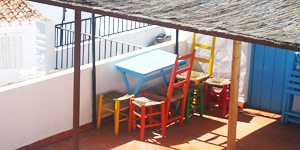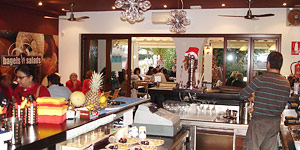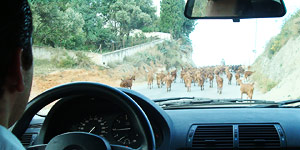Lif-in-Andalusia regularly receives questions about tips on emigration or living in Spain, Andalusia or specifically Nerja. Everyone’s situation is of course different and it makes a world of difference if you´re young or old, single or a couple, need a job, want to live in the countryside or the city, etc. There is no such thing as a “golden tip”, but here are a few – whether or not obvious – recommendations.
Inhoud
1. Learn Spanish!

Spaniards generally speak little English. Even within the hospitality industry, the level is low and that is something you have to take into account if you want to live or work in Spain. It is therefore almost a must, both for private and business purposes, to have at least a basic Spanish language level. Most residents and hibernators feel more at home the better they speak Spanish. And this of course increases the chances of success of your emigration adventure.
Learning a new language is, unfortunately, tougher than you think, especially if you are not 18 anymore. It is recommended to find a mix of basic grammar skills for example through:
- an intensive language course (once you are more advanced: better to switch to private lesson even though these might be fewer hours)
- TV (tip: put Netflix on English with Spanish language and/or Spanish subtitles)
- reading (every day a bit)
- and practical experience ‘on the street’ (you for example can prepare your visit to the store).
Learning Spanish effectively
In addition, it is useful to memorize many core words (especially conjunctions) so that you better understand the context of a story and therefore not only focus on grammar. For example, you can make a list with keywords like ´because´, ´above all´, ´however´, ´mostly´, etc. instead of learning random words from a text.
Learning a language is an endless process and in the end, it works best ‘step by step’ with a few new words every day. For example, (paying) mobile apps for your phone are also a solution, such as digital dictionaries (with all kinds of useful additional functions) and of course Google Translate (including speaking function).
2. Find a good gestor (accountant/bookkeeper)

A gestor (bookkeeper, administration office or accountant) can arrange your entire paperwork both privately and professionally. It´s not recommendable to try this yourself to save some costs. With just one mistake or missing information, you´re probably worse off.
Insurances, tax returns, registrations, advice, business administration, transferring and importing cars, registering with healthcare insurance, applying for your NIE (tax number) & residencia (residence permit) are all important tasks of the gestor during an emigration.
3. Buying a house? Lawyer needed!
Since I myself have been working at a Spanish law firm in Torrox since 2013, I am not entirely objective, but still… In Spain, the work of the notary when buying a house is usually arranged by a lawyer. He checks everything that is relevant to the house purchase, including outstanding debts and the legality of the property plus the land. In Spain this is much more complicated because of the difference between Cadastre and Land Registry and above all the different situations in the countryside with the DAFO certificate (Andalusia).
In addition, the lawyer arranges the registrations and after-sales after the signing of the title deed and – not unimportantly – the lawyer can officially represent his client through an authorization during the entire purchase process (including NIE application).
Already read some background information about the Spanish buying process
Legal research is particularly important in rural areas, where there are more frequent problems with illegal construction and permits. The financial and fiscal consequences of this can of course be significant if you will be living in Spain. Read more about this subject ‘free legal tips for buying a house‘ in Andalusia. Do you wonder what might go wrong? Check this page with ´10 examples problems buying house Spain´.
5. Make sure you have a healthy financial buffer

The price level in Spain has risen considerably in recent decades, while wages are still significantly lower than in Northern Europe. The average monthly wage in Spain is about 1.000 euros. In the hospitality industry, you can earn around 1200 per month, but then you rise well above the 40-hour working week.
In any case, emigrating and moving always costs money more money than you expect and -unless you´re a (pre)pensioner- you may not find suitable work immediately after you emigrate. Depending on the industry, there is little or no work during certain periods.
An interesting page for people that want to buy or rent a house in Spain: check prices per square meter and price developments during the past years: https://www.idealista.com/sala-de-prensa/informes-precio-vivienda/venta/andalucia/malaga-provincia/ Idealista is one of the biggest Spanish online platforms for the housing market.
6. Visit your destination in various seasons
Perhaps that cozy holiday town is completely deserted in the winter or it is not tolerable in July and August because of the heat. It is therefore useful to visit your favorite destination in advance in different seasons, including outside the holidays. Especially when you´re planning on buying a house immediately!
7. Starting a business in Spain? Be auto-critical in your expectations
If you want to start your own business, keep in mind that this will always run out in terms of time and costs. About 70% of new companies in Spain don´t survive the first 3 years. In addition, there is a good chance that you will not make a profit from day 1. And just like in the Northern-Europe, you will have to save money for publicity, tax, investment, etc. Without publicity, nobody knows you exist. A lot of people are good at their job but without marketing and a client´s network, you´re lost.
In practice, many new residents have to adjust their plans due to a lack of money or even return to their country of origin. So be really critical of your plans and do enough preliminary research. Having your own B&B sounds very romantic. But if you have to move to the cheaper inland area because of the high house prices on the coast, you have to ask yourself whether there are still enough tourists there to make your business operations profitable. It all depends on your own wishes, expectations and attitude…
8. Living in Spain? Be flexible and positive!

Emigrating is not always easy. Long working days, a new language, practical problems, uncertainty about your finances, bureaucracy. Maybe even relationship problems, homesickness and building a new social life can be tough. These are all emotional issues that you can run into. That might make you forget why you actually took this big step.
Nowadays, the psychological distance to the Netherlands through email, Skype, Facebook, Twitter, satellite TV and cheap airline tickets is smaller. Many immigrants experience this as pleasant, but it can also make it more difficult to integrate. To really build something new.
Will Spain change you?
If you already have a lot to complain about in your own country, you will probably also find enough reasons in Spain. Of course in the end everything has 2 sides. Many people leave their country because of the hectic and performance-oriented “according to the clock” life. Then, however, they are annoyed by the fact that in Spain “everything takes so long” (mañana…). Or that everything is “arranged so illogically” and don´t see the irony in it. In my opinion, negative and inflexible people should better not emigrate to Spain.
Slow living and quality of life in Spain
Ultimately, of course, your setbacks don’t determine your happiness, but the way you deal with your problems. If your own B&B has not taken off, it does not mean that you cannot be happy with a brokerage job as a waiter or as a key manager. The same goes for your personal finances after your emigration, which probably needs to be adjusted downwards. Maybe you can spend less and live less luxuriously … But fortunately for many people, this does not outweigh the extra quality of life of “living under the sun” and living in Spain for both adults and children.
9. Resident with Spanish property? Spanish last will!
If you have a property in Spain and you are a resident, it is almost advisable to sign a Spanish will. For residents, Spanish law applies after death and is very inflexible. For example, you cannot leave your property completely to your partner. Therefore you need to have a will signed in which you designate the inheritance law of your own country. However, this European law only entered into force in 2015. It may therefore mean that you have to renew your existing Spanish will. Ask your lawyer for more information about Spanish inheritance law and a Spanish last will.
9. Common assets in Spain but not married? Inscribe in the Spanish couple’s registry!
And another tip if you have assets as a resident or non-resident. If you are not married, the surviving partner pays very high inheritance tax if you are not registered in the Spanish Registro de Pareja de Hecho. This is because foreign registers or contracts are not accepted.
10. Don´t forget your insurances
When you buy a house, it is always wise to take out minimum insurance in any case. Do not assume that the insurance of the VVE will cover your damage if you get a fire or a flood. Especially in the countryside, good insurance is very important from then onwards because of the legal status of houses ‘in the campo’. Also, home insurance often has liability insurance included.
In addition to the standard public health care Seguridad Social (Centro de Salud) you can also take out private Spanish health insurance (obligated for non-EU residents).
There are many insurance brokers who make a living off commissions. On the one hand, they may not be impartial in their recommendation of the best insurance. On the other hand, however, you can often contact them if you want to submit a claim.
Also check the article on smart budget tips for residents and house-owners.

